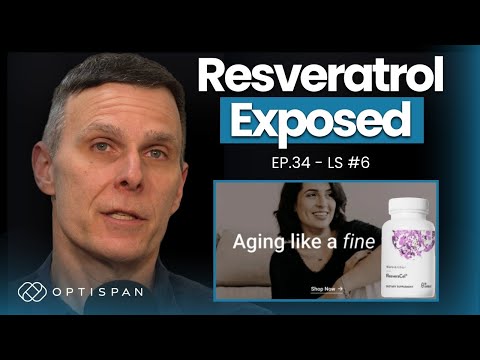Listened to it today. As with so many of the initial items that got me interested in this area … discredited!
Still like red wine, but aware it shortens my life.
Does this extend to its cousin pterostilbene? https://novoslabs.com/novos-anti-aging-longevity-supplement/pterostilbene-anti-aging-supplement-longevity/
Resveratrol is a cox-1 inhibitor. I dont like inhibiting cox-1.
Pterostilbene AFAIK is not a cox-1 inhibitor
What he says in the video is that there may be some medical benefits to Resveratrol, but not in terms of lifespan. Hence if someone has a particular problem that reveratrol may help with then maybe it will work.
However, it is not a major benefit to health/life span.
I started taking resveratrol when I started taking copper last year.
We demonstrate for the first time that cfChPs derived from dying brain cells are abundantly present in the extracellular spaces of the ageing brain. We also show that extra-cellular cfChPs are virtually eliminated by oxygen radicals that are generated following prolonged treatment with R–Cu. The fact that elimination of cfChPs was associated with down-regulation of multiple biological hallmarks of ageing and neurodegeneration makes a strong case for a direct role of cfChPs in the aetiology of these pathological processes.
A more nuanced approach is “that resveratrol acts as a life-extending agent. The effect is most potent in yeast and nematodes, with diminished reliability in most higher-order species.” This conjecture is supported in by the DrugAge database with many more recent studies in lower order species. Meanwhile, the literature supports the mechanism of resveratrol enhancing SIRT activity, whether by enhancing gene expression and/or acting as a modulator of enzymatic activity along with downstream effects, which are mechanistically associated with its pleiotropic effects. Differences in absorption and metabolism between species are being worked out, especially since in humans, only small amounts of resveratrol are absorbed, though absorption can be improved by concomitant use of piperine to inhibit PgP in the gut. Rapamycin has a much better track record in Mus musculus, suggesting it may also be effective in humans, which I believe is very likely the case, however, that has not been conclusively proven. My original quibble with the video is the contention that the assay for resveratrol —> SIRT activation was flawed (31:04), but as I said, that is not supported by many other subsequent studies, including this recent one.
Here’s Peter Attia saying there is zero benefit to Resveratrol. (instagram reel — very short)
Separately I recall David Sinclair saying in many podcasts that everyone misunderstood the protocols of other labs because resveratrol needs to be dissolved in fat/oils when administered. But no-one else “understands” this. For me, the evidence is lacking, but I’m not a practicing biochemist.
The ITP tests whether compounds get absorbed into the bloodstream, hence why spermidine was not considered after testing it for 6 months.
So whenever Dr. Sinclair claims that it’s an absorption issue, he is lying.
I do not think one can say with certainty that RES has no effect on ageing in mice from the data presented. I suspect Attia did not calculate how much RES an average mouse would eat at 300 ppm RES in chow which limits the value of the inference. A mouse eats on average 15g chow/100g body weight. A 1oz (~28g) mouse eats ~4.2 g chow per day. Chow contains 300 mg RESl/kg food (300 mg Res/1000g) which comes to 1.26 mg/mouse/day RES. In mice, RES ~20% absorbed so ~0.252 mg absorbed/day. So mouse getting 0.252mg RES/0.028 kg body weight or 9 mg/kg. This may be a trivial amount of RES to detect an effect especially when you do the allometric scaling for the faster metabolism compared to humans. In mice, 150mg/kg RES oral dose, you get 847ng/mL RES and if a linear response to dose, if 300 ppm in chow were given all at once the expected Cmax is only ~ 50 ng/mL Table 3. Spread throughout the day, plasma concentrations would be even lower. My conjecture is that much higher doses of RES would need to be tested before reaching a firmer conclusion of no effect. Or maybe test pterostilbene, which is much better absorbed. Last I checked, ITP has not tested pterostilbene.
According to the investigation that Rimon has done, low doses of resveratrol has benefits, but high doses do not (and may even be detrimental):
I continue to find Attia deeply knowledgeable in some aspects of healthspan research, especially as related to pharmaceuticals and exercise. In contrast, though, the more I read, the more I see strands of dogmatism in his thinking that lead to his not being well informed. The worst, I suppose, was listening to a sometimes glib presentation on organic fruits and vegetables in which Attia was not only poorly informed but incorrect in places, such as when he repeatedly considered concerns about the “pesticide” glyphosate to be questionable science.
Yesterday, I happened to read an Attia newsletter in which he proclaimed the last nail to have been driven into the coffin of resveratrol as a healthspan supplement. This latest determinative “nail” in Attia’s judgment consists of five studies examining endpoints of resveratrol supplementation. Three studies were four weeks in duration, one was three months, and the last six months, at respective doses of 500, 150, 150, 150, and 250 mg/day.
In considering the implications of these three very short and two intermediate length studies, Attia noted, ". . . resveratrol activated a class of enzymes known as sirtuins, which were thought to mediate the well-documented health- and longevity-promoting effects of calorie restriction – effects which include reductions in oxidative damage and in chronic, systemic inflammation (italics mine).
My first concern went to the very short duration of three studies but I thought that we still might expect to see reductions in inflammatory markers in 28 days. My second concern went to the mostly low doses. It was beginning to look like the studies we see so often when a pharma-driven study examines the effects of an OTC nutritional supplement. Based on the research, I would think 250 mg/day of resveratrol might be a reasonable floor dosage and 500 mg/day might be a ceiling.
So, what were the endpoints of these studies? Well, inflammatory markers for sure, perhaps only those markers for the ultra short studies. Nope! Here are Attia’s own words that he found worthy of a coffin nail:
"Analyses of circulating triglycerides and insulin levels utilized data from all five studies (n=267), while four studies (n=177) were used for analysis of total cholesterol and three studies (n=87) supplied data for analysis of HbA1c and liver enzymes (AST and ALT). In their evaluation of plasma lipids, the authors reported that changes in both triglycerides and total cholesterol were statistically equivalent between resveratrol and placebo treatments, though resveratrol treatment was associated with a trend toward higher triglycerides than placebo (SMD=0.11; 95% CI: −0.14 to 0.35; P =0.39). No significant differences were observed between resveratrol treatment and placebo in effects on HbA1c, insulin, or the liver enzymes AST and ALT.
Given that the observed reductions in CRP, IL-6, and TNF-α with resveratrol are decently supported by the research (as well as IL-1β, monocyte chemoattractant protein-1, and NF-κB ), it is difficult to understand the endpoints in these five studies. It is even more difficult to understand why Attia considers them to boot resveratrol out of the healthspan game.
I don’t think anything else needs to be said as the main point is not about resveratrol.
During periods of time free from rapamycin excess transcription occurs. At the same time, resveratrol can reduce errors during the processing stage.
Resveratrol gives me diarrhea. I think it’s time I just dump the remaining powder I have. It was one of the first longevity supplements I bought and I must have bought a multi year supply as I still haven’t finished it! As more and more bad press comes out, I think I just have to go ahead and waste it. Good riddance!

